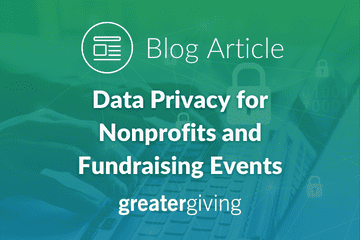
Building Trust with Transparency: Data Privacy
In today’s digital age, data privacy for nonprofits is paramount. Donors place their trust in non-profits to safeguard their personal information, especially during fundraising events. As stewards of this trust, understanding and upholding data privacy is crucial for maintaining positive relationships and ensuring long-term sustainability.
Why Data Privacy Matters for Nonprofits
Beyond maintaining a positive reputation, upholding data privacy offers a multitude of benefits for nonprofits. It’s an investment in trust, transparency, and ultimately, the sustainability and impact of your mission. Upholding data privacy helps promote:
- Donor Trust & Reputation: Breaches or careless handling of data can erode donor trust, impacting future donations and support.
- Compliance & Regulations: Failing to comply with data privacy regulations, like GDPR or CCPA, can result in hefty fines and legal repercussions.
- Ethical Responsibility: Protecting donor information is an ethical obligation, demonstrating respect for their privacy and building stronger relationships.
Data Privacy Tips for Nonprofits & Fundraising Events
- Be Transparent: Clearly communicate how you collect, store, and use donor data in your privacy policy. Update it regularly and make it easily accessible.
- Limit Data Collection: Collect only the information necessary for your fundraising efforts and event management. Avoid unnecessarily invasive data requests.
- Secure Data Storage: Utilize secure platforms like Greater Giving, a PCI-Level 1 provider, to ensure data is encrypted and protected against breaches. Using excel sheets or print outs may be left behind or easily accessed by people outside of your organization which causes a concern for data leakage.
- Restrict Access: Limit access to donor information to authorized personnel who need it for their roles. Implement access control measures. Set your user permissions to make sure only those that need to access donor information can do so securely.
- Offer Opt-Out Options: Allow donors to choose how they want to be contacted and control their communication preferences.
- Respond Promptly to Requests: Be transparent and timely in responding to data access, correction, or deletion requests from donors.
- Educate Your Team: Train your fundraising team on data privacy policies and best practices for handling donor information.
Actionable Steps for Your Fundraising Team
- Review your data collection practices: Ensure you’re only collecting essential information and obtain explicit consent from donors. For Example, do you need to know the donor’s entire birthdate?
- Partner with a secure platform: Utilize Greater Giving’s PCI-Level 1 security and data privacy features to safeguard donor information.
- Update your nonprofits data privacy policy: Ensure it’s clear, concise, and aligned with current regulations. Make it easily accessible on your website. Most organizations place a link to the full privacy policy in the footer.
- Train your team: Conduct regular training sessions on data privacy best practices and compliance requirements.
- Communicate transparently: Be upfront about data usage and provide donors with easy opt-out and communication preference options.
By prioritizing data privacy and transparency, you can build trust with your donors, foster ethical fundraising practices, and ensure the long-term success of your organization. Remember, data privacy isn’t just a compliance issue; it’s a fundamental part of respecting and valuing your supporters.
